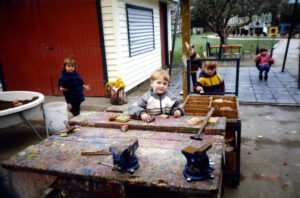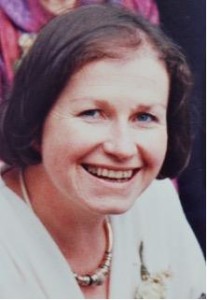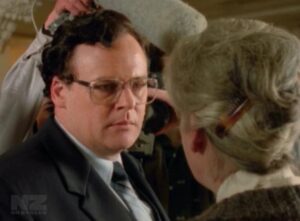1988: The Meade Report
February 4, 2022
By AHNZ

In 1987 Labour 4.0 Prime Minister David Lange gave himself the education portfolio shortly after winning re-election that year. The Department of Education was the only department not to prepare a briefing for an in-coming new Minister in accord with the protocol of assuming an election might mean a change of Executive Government. In the new year Lange set out to investigate his education bureaucracy in person and found nobody had turned up for work at all. It was January, they later explained, and as school teachers they had become accustomed to long holidays that included the month of January so they simply left their building to the tumbleweeds!
Such is Lange’s story about the education civil service as he inherited it. As much as any Libertarian would consider an inept or hands-off Public Service a second-best solution to none at all Lange, unfortunately, set about a major tune-up. His Tomorrow’s Schools reforms brought the nation’s over 5yo pupils under his capture but he also did the same for early childhood care and education (ECCE.) For this, Lange picked out Anne Meade who co-authored with him (he or his aid supplied a foreword anyway) the Meade Report (1988,) or Education to be More; Report of The Early Childhood Care and Education Working Group.
Before Lange unleashed Meade the ECCE was glorious anarchy. Apart, that is, from the mish-mash of government involvement at various levels and in particular taxpayer contributions to various organisations. Of these the report counted some 2,700 ECCE centres that took government money in various forms. The State very much had its foot in the door of ECCE and had all sorts of strings attached to the nation’s toddlers via their various kindergartens and playgroups. Lange set about playing neoliberal music on those strings and Meade was his piano tuner.
“Early in 1988 I went unannounced one lunch-time to see my departmental chiefs at the old wooden building over the road from the Beehive. As far as I could tell, the building was abandoned; I…went back to my office…an apologetic deputation of senior management arrived; they said that as former teachers they were not used to working during January.” – Lange (2005)
“Anne Meade joined the advisory group. She was a distinguished educator whose work was critical not only in the emergency of the new school administration but also in the reshaping of the early childhood sector.” – ibid
Education to be More
 Without an enriching and empowering environment for our children and their parents society is impoverished and we all suffer, wrote Meade. According to her philosophy of life ECCE was the key to making children, families, whanau, and society “more than what they are now.”1 What was wrong with who we “were now” in 1989 and what Meade wanted “more” of was obscured behind various catch-cries. Implement the Treaty of Waitangi, improve social and economic status of women, safeguard basic human rights, recognise Pacific Islanders’ needs and traditions, etc. To Meade with her grounding in developmental psychology the way to make a new New Zealand was to start with the young. The Meade Report’s ambition was no less than social engineering to build a new New Zealand. As such she was following in the footsteps of many who had come before such as Kendall, Williams, Van Asch, King, and Beeby.
Without an enriching and empowering environment for our children and their parents society is impoverished and we all suffer, wrote Meade. According to her philosophy of life ECCE was the key to making children, families, whanau, and society “more than what they are now.”1 What was wrong with who we “were now” in 1989 and what Meade wanted “more” of was obscured behind various catch-cries. Implement the Treaty of Waitangi, improve social and economic status of women, safeguard basic human rights, recognise Pacific Islanders’ needs and traditions, etc. To Meade with her grounding in developmental psychology the way to make a new New Zealand was to start with the young. The Meade Report’s ambition was no less than social engineering to build a new New Zealand. As such she was following in the footsteps of many who had come before such as Kendall, Williams, Van Asch, King, and Beeby.
Meade was axiomatically a Statist, writing of ECCE services that they were so important that “public funding for them is essential.” As if something being important automatically required government control!
Despite the headings and bullet points being obscure catch-calls the subtext of the Meade Report is full of what this woman really meant. The true subheadings to be plucked out were..
- Big Brother must control early childhood
- Parenting is a myth
- It takes a village to raise a child
Big Brother In Control
Much of the report was an organisation chart for how ECCE would be captured by government using ‘charters’ and ‘boards of trustees’ and government funding etc. Then, there was the odd reminder that ECCE was in “crisis” which was a spike to the amygdala to make it hard for down-regulated people to read the report. But the major theme was that government, not free people, had to control and pay for what was “important.” Meade wrote that “At a basic level, a major benefit from early care and education is the preservation and passing on of our culture.” She saw it as government’s role to preserve and transmit our culture as if free people had not and could not do such a thing without paying tax and being regulated from Wellington.
Meade said that the Ministry of Education, “…should have prime responsibility for the administration of early childhood services..” rather than long-standing institutions or communities or parent groups. Like the Picot Report published recently before, this was ‘Tomorrow’s Schools’ but for tiny tots. It’s interesting sometimes in New Zealand history how a controversial and risky measure that we all need is initially rolled out on the population exempting younger New Zealanders. Once the measure is firmly established our government then lowers the age group it applies to as if doing so in the first place might have triggered immediate rebellion.
Like Picot, Meade had a genius plan to wrest control from voluntary organisations and vest it into State hands under a guise of democracy. Observationally, schools would be made the property and placed under the control of the parents and community members who used them. However, like Soviet-era collective farms taken from their owners and given to the public, the end result was always to make government the true master. It was an essential first step in control to first take early childcare away from the owners and managers and a second step to provoke or allow that re-organisation to fail, then thirdly for government to ‘save democracy’ by swooping in as the New Boss. As in George Orwell’s Animal Farm (1945) a corrupt “democratic” system can be relied upon to degenerate into conflict, division, and mini-dictators.
A private school’s value, success, learning environment, unique diversity, discrimination and judgement, choice of client, and traditions were an anathema to Meade-Lange. Writing, “The discriminatory elements of the current system will be removed. In the past, government…paid no attention to equity of access to resources. Our funding proposals will both introduce- and maintain- this equity of access.” the authors intended to socialise successful ECCE and hand it over to the proletariat.
Such neo-Marxism didn’t end there because the report also used the now old Critical Theory trick of propounding one Marxist ideal while calling it the opposite. Under the heading of ‘Enhancing the family unit’ the report promoted breaking up the family unit. “Our proposals are firmly based on family-support principles…the system…will assist families to meet their responsibilities for providing early childhood care and education..” In other words, Labour 4.0’s idea of ‘enhanced family support’ was forcing (‘supporting’/’assisting’) parents to hand over control of their kids to Big Brother and do as they are told (‘take responsibility’.) It is taken as written that families are all responsible for implementing Meade’s r-selected engineering project so the only possible concept of ‘family support’ is to ‘support’ the families’ obedience role.
“Why should the government be involved….it would not be reasonable to expect most families to acquire all the knowledge and skills necessary to provide a complete range of services. Nor would it be reasonable to expect each family to bear the full cost. We believe that the inter-related nature of the key benefits of early childhood care and education necessitate the government’s presence as an administering and monitoring authority, as provider of training, and as a major source of funding.” – Meade
Who needs arguments when you can just say ‘we believe’ and deploy adjectives like ‘reasonable’ and ‘nature’ on your side?
Parenting is a Myth

Meade’s primeary target in section 3 of the report states: “Myth 1: That it is bad for the child to be separated from the mother.” On the contrary, it was better to return New Zealand to the wholesale communcal rearing normal to the Baby Boomers or the Spartans of old. Generation X kids had started forming attachments to their own parents through eye contact, attending behavior, and even skin-on-skin between baby and mother. This was a marked contrast to the wheelbarrows full of babies isolated from their parents in government maternity hospitals that Lange and Meade had grown up with. They sought to switch the pendulum back so that Millennials could grow up as r-selected.
Forget parent-focus, Meade said, quality bonds must come from “a number of people” and many bonds are better than a single bond. This genesis of collectivism is the making of Maori and Pacific Island cultures and some of those cultures, she says, don’t even have a special word for mother at all. Rather than bring the Stone Age primitivism into the age of civilisation and individual rights the idea of Meade was to turn the clock backwards for New Zealanders by breaking that parent-child attachment bond in the earliest years.
“Certainly not how our Colonial forebears cared for their babies, and not what we do now either. We know better, most of us. But for a span of years, c.1920s-1970s, New Zealander newborn babies were kept away from their mothers in separate nurseries in hospitals.” – 1907: Plunket, AHNZ
“There have been a number of myths…based on the view that a woman’s place is in the home and that it is vital for a mother to be with her children…fell on welcoming ears after the Second World War…” – Meade-Lange
The authors dismiss parental attachment in favour of tribal attachment saying that the idea a “child should not be separated from its mother” was based on ‘inappropriate evidence’ from the 1940s based on “understaffed and unstimulating orphanages in Britain.” These errors, they said, were welcomed because the War generation had a sexist agenda to keep women in the home and also sought to reserve paid employment for males2.
It Takes A Villiage
 “Early childhood services are a modern invention to replace the previous extended family,” the report told New Zealand. Grandparents, uncles, friends, neighbours, etc. were not being complimented or recognised or capitalised but “replaced” according to this carefully crafted paragraph. In Myth #3 were are informed that replacing the family and removing key responsibility for child rearing does not at all contribute to the breakdown of families. By what logic can this be so? When is literally “replacing” families not the same as “breakdown of families?” Mead has a two-pronged Orwellian ‘argument’. One is to re-define a family out of existence so that it means anything or nothing. In the 2020s a similar government (Labour 6.0) started using the Maori word “whanau” rather than family all to the same purpose. The second prong was rank name-calling: Anyone who says replacing the family is breaking down the family is a myth-peddler.
“Early childhood services are a modern invention to replace the previous extended family,” the report told New Zealand. Grandparents, uncles, friends, neighbours, etc. were not being complimented or recognised or capitalised but “replaced” according to this carefully crafted paragraph. In Myth #3 were are informed that replacing the family and removing key responsibility for child rearing does not at all contribute to the breakdown of families. By what logic can this be so? When is literally “replacing” families not the same as “breakdown of families?” Mead has a two-pronged Orwellian ‘argument’. One is to re-define a family out of existence so that it means anything or nothing. In the 2020s a similar government (Labour 6.0) started using the Maori word “whanau” rather than family all to the same purpose. The second prong was rank name-calling: Anyone who says replacing the family is breaking down the family is a myth-peddler.
Children, the report states, who receive their socilisation from parents rather than their peers are disadvantaged3. One of the stated benefits of substituting ECCE for the family is, “stronger family units because the family has found some extended family subsitues which can provide support and guidance.” This is an incredible statment showing poor reasoning skills in the author (or Sophistry) and our 1980s ancestors. Mead literally, here, came out and said that a family is a stronger unit because it is replaced. This is akin to saying a healthy arm or leg is better if amputated and replaced by a prosthetic government-issue part. Or, it is like a political party saying that agreeing with the Labour Goverment is what makes them strong.
Millennial Education
What happened to New Zealand after this report? Labour 4.0 rolled out a new legislative framework to match under the specious accademic cover it provided. Early childhood was captured more by the State, year upon year. The Millennials grew up in a different environment and their parents, though wishing to connect and transmit their culture personally, were marginalised and replaced. By the 2010s the Millennials were hurting because real life was not like their daycare centres. By the 2020s the now adult Millennials gained pain releaf because they had made real life resemble their daycare centres. Grandparents were cancelled and replaced. The Social Capital of our people started going through the floor. Single mothers turned The State into their substitute husbands and subsitute parents of their children and wrote articles such as ‘It’s never been a better time to be a single woman’…
“The New Zealand family is changing rapidly as kids grow up today who never experienced an intact family and go on to reproduce what they patterned on to.” – 2000s: History: The New Zealand Nuclear Family
 New Zealanders came to have a reduced authentic contact with their own culture and identity. That was the whole idea and a major ‘benefit’ of replacing New Zealanders’ place in their own lives with a social program: “At a basic level, a major benefit from early care and education is the preservation and passing on of our culture..It could be claimed that this cultural embedding could occur by other means, but the research evidence we have drawn upon in this section demonstrates conclusively that good early childhood care and education improves the efficiency and effectiveness of this process.”4
New Zealanders came to have a reduced authentic contact with their own culture and identity. That was the whole idea and a major ‘benefit’ of replacing New Zealanders’ place in their own lives with a social program: “At a basic level, a major benefit from early care and education is the preservation and passing on of our culture..It could be claimed that this cultural embedding could occur by other means, but the research evidence we have drawn upon in this section demonstrates conclusively that good early childhood care and education improves the efficiency and effectiveness of this process.”4
Preserving and transmitting New Zealand culture is supposed to be the role of living, acting, choosing individuals. It’s a project our ancestors set out on in the mid-C19th or earlier and one we have been working on ever since with various steps forward and back. The State deprives us of this development by offering to take it over from us. It’s almost unbelievable that anyone would accept giving up living their life and their family and their children and their autonomous destiny to a beurocratic department. Yet, we did, and for no other higher ideals in 1988 than catch-calls like ‘efficiency and effectivenes.’
This post is available as a podcast. Listen here.
—
Note: AHNZ has also reviewed Response of the New Zealand Public Service ASsociation to the [Mead] Report. Rather than anything origional or any rebuttal, it was a wholesale approval on behalf of the beurocrats union. Its writing, publishing, and even the font was worthy of a B+ high school typing student or less. I can only suppose it was created to curry favor with the Executive and to provide a basis very temporary newspaper headline that was positive to Labour 6.0 for about 1 day in October 1988.
1 pg 16 Meade Report (1988)
2 pg 11, ibid
3 pg.14, ibid
4 p15, ibid
Image ref. 1980s Kindy, Silverstream Kindergarten Collection, Upper Hutt City Library Heritage Collections
Ref. p256 My Life, David Lange (2005)
Ref. 1988: Life Education Trust, AHNZ
 Like Comment Share
Like Comment Share





